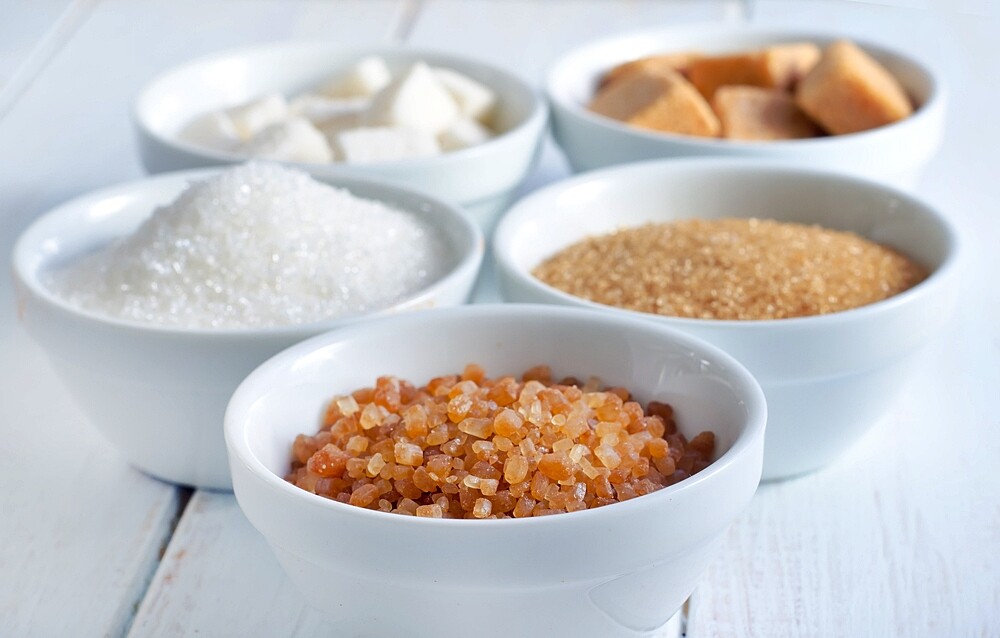More and more people are looking for a sugar substitute for industrial sugar. We present ten alternative sweeteners.
Sugar substitute: These sweeteners are available
Sugar is not per se poison or fattening. It depends on how much we consume. But this is precisely the problem: we usually do not know. Too many industrially processed foods contain hidden sugar. This increases the risk of obesity, diabetes, cardiovascular diseases, liver cirrhosis or gout. It is therefore all the more important that sugar substitutes are available. We present ten alternative sweeteners.
1. Agave syrup or thick juice
This sugar substitute originally comes from Mexico and is extracted from agave juice. It is more liquid and even more intense than honey. Its advantage: agave syrup consists mainly of fructose (fruit sugar) and therefore has the lowest glycemic index of all available sweeteners. Vegans use it as a substitute for honey.
2. Birch sugar (also: xucker or xylitol)
Originally birch sugar was extracted from the bark of the tree. Today it is made from corn. It has a slight mint taste, which explains its use in tooth-friendly chewing gum. In general, birch sugar is said to be good for oral and dental hygiene and even strengthen the body’s own defences. The sugar substitute is processed like normal household sugar. At the same time, it hardly affects the blood sugar level – ideal for diabetics.
3. Fruit sugar (fructose)
Natural fructose, which is found in high concentrations in apples, pears, berries, pomegranates or persimmons, for example, is quite healthy.
However, industrially produced foods contain a fructose-enriched syrup made from corn starch (high-fructose corn syrup or HFCS). This fructose has an unfavourable effect on our metabolism and promotes the storage of fats in our body. As a sugar substitute it can promote the development of high blood pressure, obesity and cardiovascular diseases.
4. Honey
Honey consists of 80 percent sugar (natural fructose – fruit sugar – and glucose – dextrose -) and 20 percent water. This explains its high sweetening power, which is twice as strong as normal household sugar. Because of its high sugar content, this sugar substitute is not a slimming product, and because of its sticky crystals that push into the spaces between the teeth, it is even worse for the teeth than refined sugar. The big difference: it is a natural product.
5. Coconut blossom sugar
The UN Food and Agriculture Organization (FAO) describes coconut blossom sugar as the “most sustainable sugar in the world” thanks to resource-saving cultivation and production methods. The sugar is extracted from the juice of the coconut blossom. This is boiled down into syrup, dried and then finely ground. Because of its very low glycemic index, this sugar substitute hardly raises the blood sugar level and even protects against ravenous attacks.
6. Whole cane sugar
Whole cane sugar is obtained from the juice of the sugar cane, but is not refined. Due to the natural extraction process, the trace elements and minerals contained in the sugar cane juice are retained. Whole cane sugar consists of 95 percent sucrose (sugar cane), is less sweet than normal household sugar and tastes like caramel. Its disadvantage: it accelerates the rise in blood sugar levels and makes us hungry again quickly.
7. Raw cane sugar
Raw cane sugar is a light sucrose sugar, which is obtained from the juice of sugar cane. The juice is thickened and crystallized. Because it contains molasses, the crystals are still brown in their natural state. Industrial processing produces the light-coloured, caramel-tasting crystalline sugar.
In natural trade, raw cane sugar is divided into three processing stages: Demerara, Muskovado and Syramena (or also called Cristallino). Like whole cane sugar, this sugar substitute causes the blood sugar level to rise rapidly, which promotes our sense of hunger.
8. Stevia
Stevia rebaudiana, or Stevia for short, is a South American plant with a strong sweetening effect. In Germany, the plant is still not approved as a foodstuff. Stevia, which is available in this country, is a sweetener made from stevioglycosides. It is obtained with the help of aluminium salts in a complex chemical process. This industrial product has nothing to do with natural sugar substitutes, which are low in calories and good for the teeth.
9. Sucrin/sucoline
Both sweeteners are based on erythritol – a natural sugar alcohol with a fruity, sweet taste. It is found in foods such as fruit, wine and cheese. Its sweetening power corresponds to about 60 to 80 percent of normal household sugar. It is obtained by the fermentation of sugar by yeast fungi. Compared to other sugar alcohols, erythritol has a particularly high digestive tolerance. This is why side effects such as flatulence and diarrhoea during the acclimatisation phase are minimal with this sugar substitute.
10. Sugar cane syrup
Sounds healthier somehow, but it’s just regular white sugar. In this country it is made from sugar beet, worldwide from sugar cane. For this purpose, pressed sugar juice is boiled down to form syrup, the sucrose it contains is separated from the remaining sugar components, then bleached and crystallized. The result is an industrial product that can damage our health, teeth and figure if consumed in excess.

